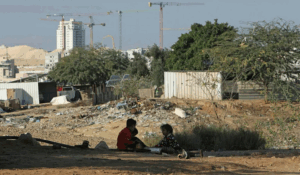Israel’s Negev nightmare: Bedouin in their own communities, Dimona for Jews alone

The village of Ras Jraba with the city of Dimona seen in the background in 2024
Marwan Abu Frieh writes in Haaretz on 21 November 2025:
A multiyear legal proceeding came to an end last week, putting hundreds of residents from the Negev Bedouin village of Ras Jrabah in immediate danger of being expelled. The Supreme Court denied the appeal filed by the residents to overturn the district court’s decision and approved an eviction order for the entire community to make way for an expansion of the neighboring town of Dimona.
It was a clear victory for “dry law” – a formal determination that a license to use public land could be rescinded. The rule is that planning claims have their place in administrative planning proceedings.
But behind the legal formulations is a political-social reality in which hundreds of women, men and children, who work in Dimona and obtain essential services there, will now be cast into the unknown.
The government entered these legal proceedings wearing three contradictory legal and institutional hats – as the land owner (via the Israel Land Authority), as the entity planning the expansion of Dimona at the expense of the Bedouin village and as the entity responsible for its residents’ social welfare. It’s a recipe for institutional failure because it systematically divides responsibility, thereby preventing a fair balance among the three hats.
As a landowner, the state is telling the court that it has “no authority to regulate,” which is the responsibility of “planning institutions.” But the planners tell the residents of Ras Jrabah that “the plan is not yet ready. We need to wait for future decisions.” The planning authorities then shift responsibility to the Israel Land Authority and the Authority for Development and Settlement of the Bedouin in the Negev, leaving the residents with nowhere to turn.
This isn’t a “balancing of interests” but a system that shifts responsibility among various parties, producing a policy of “evict now, plan later.” When there’s no sustainable permanent solution, it’s eviction for eviction’s sake – whitewashing displacement under the auspices of the formal law.
The transcripts of the Supreme Court hearing last March are painful to read. The government offered temporary fixes, including paying rent, possible vacant lots in Qasr al-Sir, calling it a “technical matter” that will not last long. Even though Justice Yael Willner found that “no permanent solution exists,” the court gave a green light to evict the residents and left them in a state of complete uncertainty about their future.
The offered “solution” could lead to violence, as displacing the residents to Qasr al-Sar, the government’s “preferred destination,” would cause serious social problems. The residents of Ras Jraba say that’s because the lots being offered are located in another tribe’s territory. Customary law, which strictly defines boundaries between tribes and families, considers the transfer of a community to territory that “belongs” to another community a serious violation and a source of potential violent conflict.
Moreover, the Qasr al-Sar “solution” is science fiction from a planning perspective. There is no infrastructure there, none of the land is ready for housing, and there is no community infrastructure to absorb the hundreds of displaced people.
The court and the authorities acknowledge customary law and the lack of infrastructure, but do not take any of that into account and are deliberately creating the risk. The practical result of the ruling, even if left unstated, is segregation: Bedouin in Bedouin communities and Dimona for Jews alone. There’s no intention to integrate an urban Bedouin village into the city, as required by the planning procedures. It’s displacement through administrative means, a whitewash.
Although the law allows for the eviction of “authorized residents” (who are on the land with the knowledge and consent of the government), the government should be enforcing the law in a way that doesn’t needlessly break up communities.
When the master plan involved in the eviction order was sent back to the planning committee a few months ago for reconsideration and no integration option ruled on, then people should not be evicted until they have somewhere to go.
The government could order the eviction suspended tomorrow. It should then sit down with the municipality and planning institutions, prepare an integrated plan and speak in the language of partnership, not population management. It needs to convert “temporary transition” into permanent recognition. This isn’t only a legal question. It’s a decision about the image of Israeli society and what kind of Negev we want to see.
Marwan Abu Frieh is the Negev office coordinator for Adallah and has been part of the Ras Jrabah residents’ legal team.
This article is reproduced in its entirety
